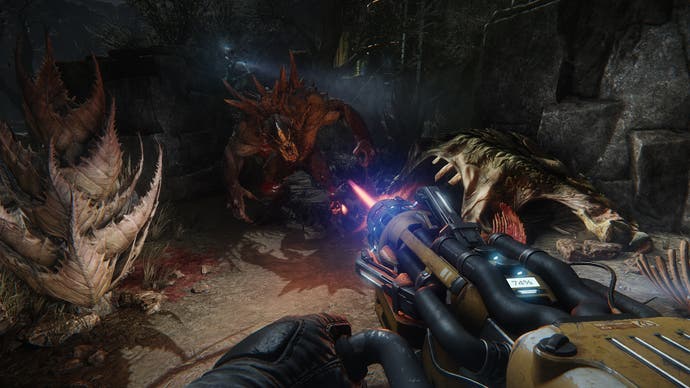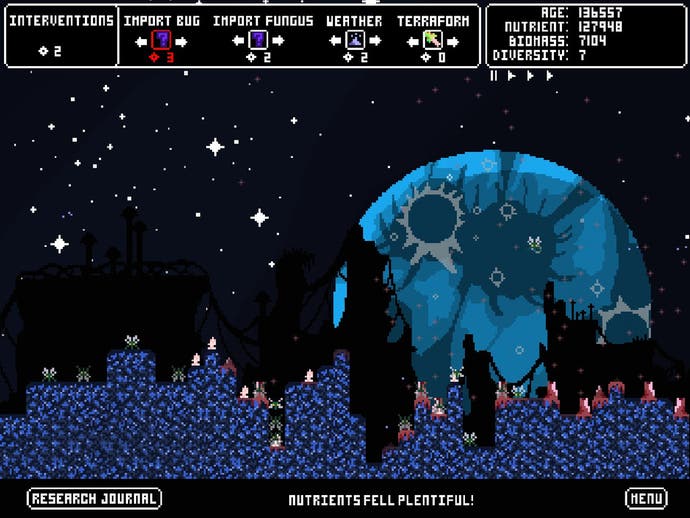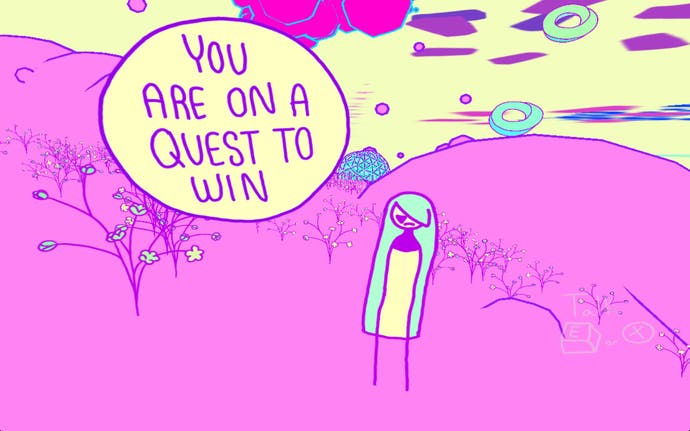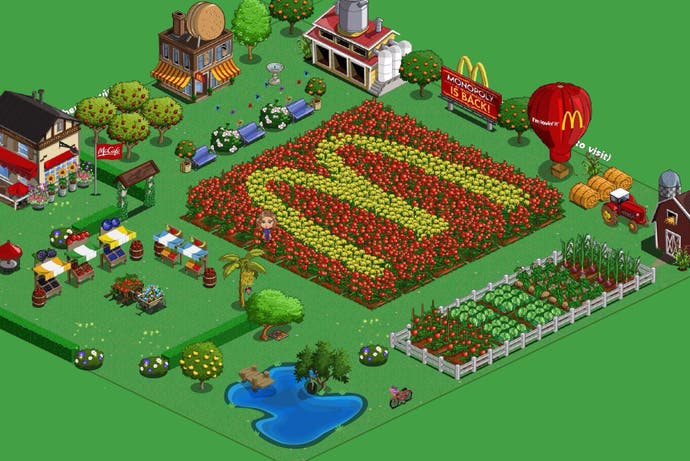The problem of farming, and the rise of video game gardens
Games are becoming too beholden to superficial, repetitive progression. It's time we stopped to smell the roses.
Has it really been a few years since FarmVille smashed Facebook's traffic records, peaking with a monthly audience of over 80 million active users worldwide? According to the analytics platform App Data, this most legendary and notorious of free-to-play games now ranks 92nd, light-years behind latter-day blights on our attention spans like Candy Crush Saga and Clash of Clans. How the mighty fall - and yet, if FarmVille's cereal box vistas of nodding crops and twinkly-eyed livestock seem laughably outmoded, its heart beats on in the shape of our unabated thirst for incremental virtual gain. Games that are actually about farming remain relatively few, for all Excalibur's efforts to infest the high street with combine harvester simulators, but games in which you "farm", gathering handfuls of XP or cash from slain opponents who conveniently respawn when out of view, are very much the norm.
I enjoy a good old-fashioned resource run myself - it's a little like a warm-up jog, building muscle for a marathon boss encounter - but I think there are all sorts of problems with "farming". The superficial objection is that it's a bizarre choice of term. I mean, take a minute to think about what you're actually doing when you "farm". In Destiny, it's blasting a path to Crota's lair and hacking him apart, over and over, in hopes of that one Engram drop that yields a fancy rocket launcher, which will then marginally speed up the process of blasting a path to Crota's lair and hacking him apart, over and over. In Bloodborne, it's rampaging down from the Great Bridge to Central Yharnam, ripping into deformed yet recognisably human townsfolk for the sake of a few measly blood vials.

To describe all this as farming rather than, say, "massacring" seems euphemistic to the point of chilling, but perhaps the issue isn't that games have misappropriated the term "farming". Perhaps the real concern is that games represent farming as presently understood in the west a little too faithfully. For all the efforts of ecological campaigners, modern agribusiness still relies on the hazy public conviction that the environment is an inexhaustible, abstract resource, where the amount one can extract is limited only by the quality of the machinery or logistics brought to bear. It's a vision purged of outward violence - the planet's other species are simply there to be scooped up and processed, with all the inevitable destruction and blood-letting carefully hidden from view. As theorists like University of Connecticut professor and self-confessed FarmVille nut Alenda Chang have observed, most games that allow "farming" are essentially performances of this desensitisation, offering up sunny landscapes that can never be bled dry, never whittled down to the point of collapse.
Accusing developers of bamboozling people into perceiving the real world this way is a step too far - I have faith in the average human's ability to distinguish fact from fiction - but I think video games are passing up the opportunity to imagine alternatives to such unsustainable models of consumption. Even blockbuster shooters like Call of Duty have sought, however clumsily, to expose the bankrupt ideologies at the root of modern war. Why not, then, the rhetoric of the companies whose products fill our supermarkets, who displace communities for the sake of feed crops, whose plants and factories are ring-fenced by legal controls? It seems like an awfully big target to miss - and this doesn't have to involve a dry political lecture (if you've read this far, well done). The fabulous Dark Souls, for example, gives us a world that has been all but burned away to nothing, in which every creature is doomed to be endlessly slain and resurrected, its spiritual worth consumed and re-consumed in the quest for transcendence. It's an implicit, multi-faceted challenge to prevailing orthodoxies about sustainable economic growth. If the 20th century was the western world's Age of Fire, inaugurated by the combustion engine and accelerated by the cultural upheavals of the World Wars, an Age of Dark appears increasingly unavoidable.

Or it could take the form of a multiplayer shooter like Evolve, which is dependent on "farming" yet manages to make cranking out XP feel fittingly rapacious and cruel. It casts you, after all, as either a gigantic predator hell-bent on devouring every organism within smelling distance, or a thug recruited by interstellar corporations to defend what remains of a planet-wide mining operation. The effects of this clash over resources on the planet itself are even tracked, match by match; in the game's campaign mode, one side's victory alters the terrain chemistry of the next map, making it harder and harder for the other side to recover. The structural investigation of climate change anxiety isn't prominent, and perhaps wasn't entirely deliberate, but it's hard to ignore.
If individual critiques of farming have their merits, there remains a need for an overarching concept to bring together such misgivings and catalyse some kind of counter-culture - particularly as developers switch to indirect revenue models, where turning a profit is all about keeping players grinding away at the coalface. One possibility is the concept of a garden. Throughout recent history, gardens have served as a useful way of thwarting or at least suspending the all-consuming productivity ethic of capitalist society. Professor George McKay of the University of Salford writes, for example, that city allotments can be "wilfully anti-capitalist": they're made available for token rents, and plot holders are often forbidden from selling their produce for profit. Gardens can be industrialised spaces, as the surfeit of browser-based "garden sims" that are functionally indistinguishable from FarmVille attests, and they can be sinister manifestations of inherited wealth and privilege. But they're also commonly retreats - places where nothing is expected of you, where no progress or productive activity is required - and this restfulness is politically charged.
It's a generalising remark, but I think the concept of garden as unproductive, uncontested ground has found a following (or as a terrible person might have it, taken root) among independent game artists and smaller teams. Consider Gardenarium from Paloma Dawkins and Kyler Kelly, a first-person adventure that tasks you, as many a game has, with reaching the top of a mountain while collecting shiny objects, but which boils down to marvelling at psychedelic dream vegetation while other characters speculate aloud about the player's presence and purpose. And then there's Eric Hornby's lo-fi simulation Earthtongue. Available for a song on Steam, the game puts you in charge of a procedurally generated terrarium, a grid of blue-grey earth wincing in the glare of a harvest moon, home to a variety of neon fungus and twitchy yet huggable insectoids. I say "puts you in charge", but really, it's up to you how much responsibility you assume, with no objectives to speak of besides a vague commitment to the greatest possible biodiversity, and no reward for raising a thriving ecosystem save the slaking of your curiosity about the organisms in question.

This lack of an overarching goal for the player is disconcerting, not least because as with Evolve's critters, everything inside the simulation is so single-minded in its pursuit of growth and procreation. Sitting back to spectate as the landscape buds and withers of its own accord rouses genuine unease, as lovely as it is to click the tab after 15 minutes and find that a once-barren valley has somehow become a teeming jungle. But if games like Earthtongue and Gardenarium dissatisfy, the problem isn't that it doesn't give you enough of a push - it's that we're too used to being pushed around by games, often while under the delusion that we're letting our minds wander.
Thanks to the rise of free-to-play, we're in danger of thinking of "farming" as the point of the experience, rather than groundwork for an adventure, and the result is that exciting tools or variables are diluted, their imports and applications spread thinly across a framework of numbing repetition. Games don't have to "feel productive", and if as entertainment works they aren't obliged to stage grand social or economic interventions, they should surely offer more intriguing choices than how many hours we want to spend harvesting blood vials or nailing Crota.

